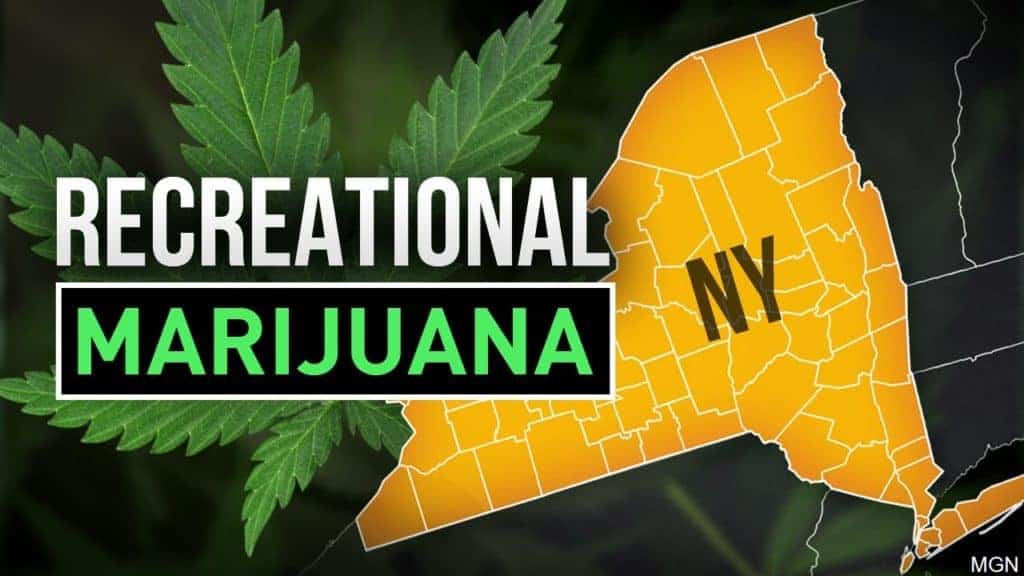
By Dan Murphy
Governor Andrew Cuomo signed legislation last week that legalized the recreational use and sale of marijuana in New York State. Calling it “a historic day” Cuomo signed the legalization bill into law on March 31, but many parts of legal pot in NY will take months and even years to complete before any bit of marijuana is legally grown and sold —
Immediate effects of the legalization of marijuana include:
- Anyone over the age of 21 can legally possess up to 3 ounces of pot in NY starting immediately.
- Smoking marijuana is now permitted anywhere in New York where smoking in permitted. But smoking marijuana and cigarettes is NOT permitted near schools – many indoor and outdoor areas already prohibit smoking. Smoking cannabis, however, is not permitted in schools, workplaces or inside a car. In New York City, it will be banned in parks, beaches, boardwalks, pedestrian plazas, and playgrounds, where tobacco smoking is banned. Smoking is generally permitted on sidewalks in the city.
Delays in the sale and growing of marijuana include:
- Adults will have to wait to legally grow marijuana at home. The state must still write specific regulations for home growing, which could take between 6-18 months. The new law permits individuals to grow 6 plants per adult member of a household, or a maximum of 12 plants per household. The plants must stay on an owner’s or renter’s property, or indoors, and “reasonable” steps must be taken to secure the plants to prevent access by anyone 21 and under. It may take 18 months for New Yorkers to legally grown marijuana in their homes.
- No one can sell marijuana legally in NY, even after the bill was signed into law. That is because the state must establish the Office of Cannabis Management, write the rules, and seek retail vendors and issue licenses. At the earliest, legal sales won’t happen until April 1, 2022, and could take another 6 months, or perhaps until 2023.
So, the question becomes, while it is legal to possess and smoke marijuana in New York, you can’t buy it in NY, and technically, you can’t legally buy it in Massachusetts and bring it back to NY, although tens of thousands of smokers do so. That is because Federal law still makes possession of marijuana a crime.
The new law also allows towns, villages, and cities the right to Opt-Out of legalizing marijuana. If that happens, residents in that community could put the matter on a referendum ballot. Any Opt -out law must happen by the end of 2021.
Revenues from legal marijuana will come from a 9% state tax, plus a 4% local tax. Estimates have the state collecting $350 million per year in pot taxes.
Police can no longer search subjects based on the smell of marijuana. Driving under the influence of marijuana is still a misdemeanor, and there is no mechanism to test drivers to see if they are under the influence of marijuana.
Marijuana growers and sellers estimate the NY Marijuana market to be near $4 Billion per year, creating at least 30,000 jobs. Upstate NY farmers could benefit the most from legalization.
“This is a historic day in New York, one that rights the wrongs of the past by putting an end to harsh prison sentences, embraces an industry that will grow the Empire State’s economy, and prioritizes marginalized communities so those that have suffered the most will be the first to reap the benefits,” said Governor Andrew Cuomo.
The bill passed by a 40-23 vote in the State Senate and a 94-56 vote in the Assembly. Every republican in the state legislature voted no. One reason for their no vote was the belief that the new taxes will increase prices for legal sales and keep the illegal market alive.
Opposition to legalization to marijuana locally in New York State has come from Long Island. Four Long Island Mayor’s, from Rockville Centre, Freeport, Atlantic Beach, and Island Park say they will opt out. While they have the right to opt-out, they will not receive any tax revenue from sales statewide.
In Westchester, so far, no village, town or city government has said they will opt out. Greenburgh Supervisor Paul Feiner told us, “I don’t think we will opt out, but I think we will regulate locations where it can’t be sold.”
State Senate Majority Leader Andrea Stewart-Cousins, from Westchester, said, “Today, New York stepped up and took transformative action to end the prohibition of adult-use marijuana. This legislation is a momentous first step in addressing the racial disparities caused by the war on drugs that has plagued our state for too long. This effort was years in the making and we have finally achieved what many thought was impossible, a bill that legalizes marijuana while standing up for social equity, enhancing education and protecting public safety. I applaud Senator Liz Krueger and Assembly Majority Leader Crystal Peoples-Stokes for their commitment and leadership on this issue.”
New York State hopes on awarding 50% of new cannabis licenses to “social equity” applicants, defined as people from “communities disproportionately impacted by the enforcement of cannabis prohibition.” Minority owned and women owned businesses, as well as Veterans and distressed farmers, will also be prioritized.
NY State also hopes to reinvest 40% of revenues into communities most affected by past drug enforcement. The reinvestment could come in the form of, public schools, public education and drug treatment, or other type of reinvestment fund. Past convictions for marijuana-related crimes will be “expunged” from a person’s record.
In late 2022 or early 2023, look for cannabis lounges to pop up like a local pub, with happy hour smoking specials, and home delivery. New York’s law makes it the 15th State to fully legalize recreational marijuana.





